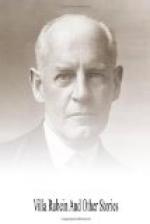When old Nicholas Treffry died, his estate, on the boundary of Cornwall, had been sold and divided up among his three surviving children—Nicholas, who was much the eldest, a partner in the well-known firm of Forsyte and Treffry, teamen, of the Strand; Constance, married to a man called Decie; and Margaret, at her father’s death engaged to the curate of the parish, John Devorell, who shortly afterwards became its rector. By his marriage with Margaret Treffry the rector had one child called Christian. Soon after this he came into some property, and died, leaving it unfettered to his widow. Three years went by, and when the child was six years old, Mrs. Devorell, still young and pretty, came to live in London with her brother Nicholas. It was there that she met Paul von Morawitz—the last of an old Czech family, who had lived for many hundred years on their estates near Budweiss. Paul had been left an orphan at the age of ten, and without a solitary ancestral acre. Instead of acres, he inherited the faith that nothing was too good for a von Morawitz. In later years his savoir faire enabled him to laugh at faith, but it stayed quietly with him all the same. The absence of acres was of no great consequence, for through his mother, the daughter of a banker in Vienna, he came into a well-nursed fortune. It befitted a von Morawitz that he should go into the Cavalry, but, unshaped for soldiering, he soon left the Service; some said he had a difference with his Colonel over the quality of food provided during some manoeuvres; others that he had retired because his chargers did not fit his legs, which were, indeed, rather round.
He had an admirable appetite for pleasure; a man-about-town’s life suited him. He went his genial, unreflecting, costly way in Vienna, Paris, London. He loved exclusively those towns, and boasted that he was as much at home in one as in another. He combined exuberant vitality with fastidiousness of palate, and devoted both to the acquisition of a special taste in women, weeds, and wines; above all he was blessed with a remarkable digestion. He was thirty when he met Mrs. Devorell; and she married him because he was so very different from anybody she had ever seen. People more dissimilar were never mated. To Paul—accustomed to stage doors—freshness, serene tranquillity, and obvious purity were the baits; he had run through more than half his fortune, too, and the fact that she had money was possibly not overlooked. Be that as it may, he was fond of her; his heart was soft, he developed a domestic side.
Greta was born to them after a year of marriage. The instinct of the “freeman” was, however, not dead in Paul; he became a gambler. He lost the remainder of his fortune without being greatly disturbed. When he began to lose his wife’s fortune too things naturally became more difficult. Not too much remained when Nicholas Treffry stepped in, and caused his sister to settle what was left




